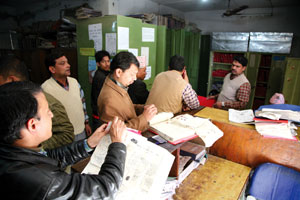 MIN RATNA BAJRACHARYA |
"Bureaucracy is a giant mechanism operated by pygmies," declared Honor� de Balzac. Going by the evidence, our civil servants would feel perfectly at home in 19th-century France. The Nepali public has no choice but to put up with its archaic bureaucracy, even as we move forward with such 21st-century staples as machine-readable passports.
Optimistically, I imagined the tourism sector would be better in this regard. After all, it is still Nepal Tourism Year 2011, and what tourist in possession of all his faculties would risk scrambling them on the altar of an impenetrable bureaucracy? This optimism remained intact as I received some trekking buddies at the airport last month; I waved away their complaints that they would have to wait an hour for their visas � that Nepal grants visas on arrival was clear evidence of a desire to facilitate hassle-free tourism, was it not?
I was quickly disillusioned once I began the paperwork for Manaslu circuit permits, even with the base camp support provided by a friend's travel agency in the form of a voluminous folder containing insurance guarantees for a porter, itinerary printouts, fake inventories of camping equipment (though we were tea-housing), and many other documents I didn't even bother looking at. With porter Mohan off to the Nepal Tourism Board to pay the two conservation area fees, I volunteered to manage the permits myself as the unofficial 'guide'.
My heart sank when the process was explained to me. One office was bad enough, but three? Fortunately they were all located off the linear stretch from Putalisadak to Thapathali. First on the list was the insurance firm, challengingly tucked away in an alcove on the top floor of a mall yet to commence operations. Second was the Rastra Bank, to pay out dollars for permits. This, too, was more amusing than anything else, from the slapdash conversion via plywood partitions and Podrej filing cabinets of what looked like the banquet hall of an old Rana palace to the insistence on copying out (twice) the serial numbers of the dollars dispensed.
But the Department of Immigration gave no quarter. As I shuttled along seemingly random trajectories over the next few hours, I noted down my movements, hoping to detect evidence of the blind watchmaker behind the Great Nepali Bureaucracy:
"I trek to the third floor and stand in a scrum in Room 301. Man 1 takes my file, leafs through it, and sends me to Accounts Section, Room 103, first floor. I get a receipt from Woman 1 and head back to the third floor to find Man 1 has disappeared. We wait. When Man 1 returns after 15 minutes he checks my file again and sends me to Room 302 on the other side of a glass partition through which staff shout at each other. Man 2 takes file, signs, and sends me to Room 105, first floor. I enter Room 105 and wait. A guide comes in and jumps the queue. Man 3 looks through my folder, talks politics on the phone for 5 minutes, then starts on my folder again before pausing to ask, 'Have I looked at this already?' He signs, and sends me to the third floor where Man 1 gives me a permit form. I fill it out and am sent to Man 2, who has now disappeared. We wait. And wait. Until Man 1 suggests we accost Room 105, first floor, where all the directors (Man 2 included) have retreated. We wait, as Man 4 and Woman 2 half-heartedly pass on the message (that we are waiting). Finally Man 2 exits Room 105 and we all troop back to the third floor, then wait while he resolves some other issue. Man 2 then signs our papers and sends us back to Man 1, who stamps the permits."
If reading such an account is tedious, imagine how much worse it is to act it out? All our administrative processes are bonafide Rube Goldberg machines, the circular loops of which are oftentimes bypassed via connections or well-placed bribes. In the tourism sector, foreigners are mostly shielded from this madness by travel agencies, whose services they pay for through the nose. It is Nepalis who bear the brunt of the state's inefficiency. This deliberate inefficiency, in creating uncertainty (and the impression of work being done), shifts the balance of power towards civil servants. Thus is born the civil potentate, to whom we must present ourselves as supplicants.
The civil servants who summitted Everest this spring at the taxpayer's cost said the junket meant to prove they are not 'adventure-adverse idlers'. Adventurous they may well be, but they have a mountain to climb to prove to us that they are anything but idle.
Read also:
The kingdom within the republic, CAILIN KEARNS in MUSTANG
Not everyone is happy with Mustang turning into Thamel



